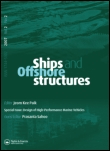
Ships and Offshore Structures
Scope & Guideline
Transforming Challenges into Opportunities in Offshore Structures
Introduction
Aims and Scopes
- Hydrodynamic Analysis:
Research related to the hydrodynamic performance of vessels, including the study of wave interactions, slamming loads, and the effects of different hull shapes and configurations. - Structural Integrity and Reliability:
Investigations into the structural performance of ships and offshore structures under various loading conditions, including fatigue, buckling, and impact loads. - Marine Propulsion Systems:
Studies focused on the design and optimization of propulsion systems, including traditional and innovative technologies, to enhance efficiency and reduce environmental impact. - Control Systems and Automation:
Research on control strategies for autonomous vessels, maneuvering models, and the integration of advanced technologies for improved operational safety and efficiency. - Materials and Manufacturing Techniques:
Exploration of new materials and manufacturing processes, including the use of composites and advanced welding techniques, to improve the performance and durability of marine structures. - Environmental Impact and Sustainability:
Analysis of the environmental aspects of maritime operations, including life cycle assessments, energy efficiency, and the implementation of sustainable practices in shipbuilding and operation.
Trending and Emerging
- Autonomous and Unmanned Vehicles:
There is a growing focus on the development and control of autonomous ships and underwater vehicles, driven by advancements in AI and machine learning, which enhance navigation and operational efficiency. - Renewable Energy Integration:
Research on integrating renewable energy sources, such as wind and wave energy, into maritime operations is trending, highlighting the industry's shift towards sustainability and reducing carbon footprints. - Advanced Materials and Composites:
The use of advanced materials, including composites and hybrid structures, is increasingly being explored to improve the performance and durability of marine vessels and offshore installations. - Digital Twin Technology:
The application of digital twin technology for monitoring and predicting the performance of maritime systems is emerging, providing real-time insights and facilitating proactive maintenance. - Climate Change Adaptation Strategies:
Research addressing the impact of climate change on maritime operations, including resilience planning for offshore structures and adaptation strategies, is gaining importance as environmental concerns grow.
Declining or Waning
- Traditional Shipbuilding Techniques:
There has been a noticeable decrease in research focused on conventional shipbuilding methods, as the industry shifts towards more modern techniques and materials that provide enhanced performance and efficiency. - Conventional Energy Sources:
Research related to traditional fossil fuel-based propulsion systems is declining as the maritime industry increasingly explores alternative energy sources, such as hydrogen and electric propulsion. - Basic Hydrodynamics without Advanced Simulation:
The focus on basic hydrodynamic principles has waned in favor of more complex simulations and computational fluid dynamics (CFD) approaches that provide detailed insights into fluid-structure interactions. - Non-Automated Navigation Systems:
As autonomous and semi-autonomous vessels gain traction, research on manual navigation systems has decreased, reflecting the industry's move towards automation and smart technologies.
Similar Journals

Australian Journal of Civil Engineering
Innovating Infrastructure for TomorrowThe Australian Journal of Civil Engineering, published by Taylor & Francis Ltd, stands as a pivotal platform within the field of civil and structural engineering. With an ISSN of 1448-8353 and an E-ISSN of 2204-2245, this journal consistently delivers high-quality research and innovative practices from both established and emerging scholars in the discipline. Recognized in the Q2 category for Civil and Structural Engineering in 2023, it holds a respectable position, ranking 146 out of 379 within its field according to Scopus, which places it in the 61st percentile. Converging valuable insights from 2011 through 2024, the journal encompasses a broad scope of topics, including sustainable infrastructure, innovative materials, and advanced construction techniques, thereby addressing contemporary challenges faced by engineering professionals. Though it is a traditional publication without open access options, the quality of the research featured ensures that it remains an essential resource for academics, practitioners, and students striving to enhance their knowledge and contribute to the dynamic field of civil engineering.

Journal of Machinery Manufacture and Reliability
Advancing innovation in machinery manufacture and reliability.The Journal of Machinery Manufacture and Reliability, published by PLEIADES PUBLISHING INC, serves as a pivotal platform for advancing knowledge in the fields of Industrial and Manufacturing Engineering, Mechanical Engineering, and Safety, Risk, Reliability, and Quality. Having adopted an Open Access model since 2015, this journal facilitates global dissemination of research findings and innovations, ensuring that critical developments in machinery manufacture resonate across the academic and professional spectrum. With its ISSN 1052-6188 and E-ISSN 1934-9394, it has established itself within established quartiles, notably Q3 in key engineering categories according to the 2023 metrics. Its Scopus rankings underscore its emerging impact, though it remains an area for growth, making it an excellent venue for early-career researchers aiming to contribute to a growing body of literature. The journal's commitment to high-quality, accessible research positions it as a must-read for academics and practitioners alike, fostering innovation and collaboration in the machinery manufacturing sector.

Magazine of Civil Engineering
Elevating Standards in Building and Construction ResearchMagazine of Civil Engineering, published by ST-PETERSBURG STATE POLYTECHNICAL UNIVERSITY, is a prominent open access journal dedicated to the field of civil and structural engineering. With an ISSN of 2712-8172 and E-ISSN 2071-0305, it serves as a vital platform for disseminating high-quality research, innovative methodologies, and current trends in building and construction. Since its inception in 2010, the journal has embraced open access, ensuring broad visibility and accessibility for its contributions to the academic community. The magazine holds a respectable position in the academic hierarchy, ranked in the Q3 quartile for both Building and Construction and Civil and Structural Engineering categories as of 2023. It is indexed in Scopus, amplifying its societal impact and reach with a rank of #114/223 in Building and Construction and #224/379 in Civil and Structural Engineering. Researchers, professionals, and students alike are encouraged to engage with the cutting-edge studies presented in the magazine, contributing to the advancement of knowledge and practice within the civil engineering domain.
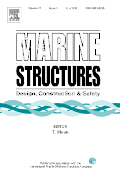
MARINE STRUCTURES
Transforming Ideas into Marine Engineering ExcellenceMARINE STRUCTURES, published by Elsevier Science Ltd, is a premier scholarly journal that has established itself as an essential platform for the dissemination of cutting-edge research in the fields of Marine Engineering, Ocean Engineering, and Materials Science. With an impressive H-index reflecting its substantial citation impact, and boasting a Q1 ranking across several categories including Materials Science and Mechanical Engineering as of 2023, this journal is recognized globally for its contributions to advancing knowledge and innovation in marine structures. The journal covers a wide range of topics, from the design and analysis of marine structures to the latest technologies and methodologies in ocean engineering, making it invaluable for researchers, professionals, and students alike. As the journal continues to publish high-quality articles that explore contemporary challenges and opportunities within the marine domain, it serves as a catalyst for collaboration and knowledge exchange among academia and industry. Researchers are encouraged to submit their original works and benefit from the rigorous peer-review process that ensures the quality and reliability of published content. MARINE STRUCTURES is not currently an open access journal, providing a subscription-based model that facilitates access to its authoritative body of knowledge.

Australian Journal of Mechanical Engineering
Empowering Engineers with Peer-reviewed Insights and Practical Applications.The Australian Journal of Mechanical Engineering is a distinguished publication in the realm of mechanical engineering, dedicated to advancing the knowledge and application of engineering principles within the industry. Published by TAYLOR & FRANCIS LTD in the United Kingdom, this journal has been integral to the field since its inception, featuring a range of peer-reviewed research articles, reviews, and technical notes that collectively aim to bridge theoretical research with practical applications. With an impressive Scopus ranking of #271 out of 672 in Mechanical Engineering, positioning it within the 59th percentile, the journal continues to uphold rigorous academic standards, currently occupying Q3 in the 2023 quartile rankings. Researchers, professionals, and students alike will benefit from its comprehensive coverage and insightful contributions, providing a vital platform for knowledge exchange and innovation in mechanical engineering.
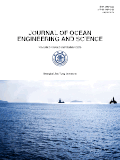
Journal of Ocean Engineering and Science
Navigating the depths of ocean engineering and science.The Journal of Ocean Engineering and Science, published by Elsevier, is a prominent academic journal dedicated to advancing the field of ocean engineering and environmental sciences. Since its inception as an Open Access journal in 2016, it has rapidly gained recognition, achieving significant impact factor ratings with notable placements in the prestigious Q1 category for Ocean Engineering and Oceanography, and Q2 for Environmental Engineering in 2023. With a remarkable ranking of #3 out of 105 in Ocean Engineering and #4 out of 145 in Oceanography according to Scopus, the journal plays a critical role in disseminating cutting-edge research and innovative solutions addressing complex challenges faced by marine environments. Operating from Amsterdam, Netherlands, the Journal of Ocean Engineering and Science invites contributions from researchers, professionals, and students worldwide, emphasizing the importance of interdisciplinary approaches in achieving sustainable maritime practices.

Ocean Systems Engineering-An International Journal
Driving Progress in Automotive and Ocean Engineering ResearchOcean Systems Engineering - An International Journal, published by TECHNO-PRESS, is a pivotal platform for the dissemination of cutting-edge research in the fields of Automotive Engineering, Mechanical Engineering, Ocean Engineering, and Water Science and Technology. With its ISSN 2093-6702 and E-ISSN 2093-677X, the journal serves as a key resource for scholars and practitioners alike, offering insights into innovative solutions and advancements within these disciplines. Operating under a Q3 ranking in several categories including Automotive and Ocean Engineering, the journal showcases research that significantly contributes to both theoretical and practical aspects of engineering and environmental science. Although it does not currently offer an open-access model, the journal maintains an active presence in the academic community, supported by a dedicated readership keen on exploring the latest developments from 2017 to 2024. Situated in South Korea, it is uniquely positioned to bridge international research efforts and enhance collaborative studies aimed at addressing critical ocean-related challenges.

Aerospace
Pioneering Research for Tomorrow's Aerospace LeadersAerospace is a premier open-access journal published by MDPI, established in 2014 and dedicated to the dynamic field of aerospace engineering. With an impressive Q2 ranking in the 2023 category of Aerospace Engineering, this journal is a vital resource for researchers, professionals, and students interested in advancements and innovations in aerodynamics, avionics, propulsion, and more. Operating from Switzerland, Aerospace provides a platform for the dissemination of high-quality research articles and reviews, contributing to the ongoing dialogue in the aerospace community. This journal not only enhances visibility through its open access model but also ensures that critical knowledge is freely available, fostering collaborative efforts and inspiring the next generation of aerospace engineers. With a Scopus ranking of #60 out of 153 in the Aerospace Engineering category, it plays a significant role in shaping the future of aviation and space exploration.
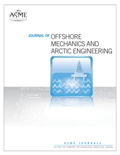
JOURNAL OF OFFSHORE MECHANICS AND ARCTIC ENGINEERING-TRANSACTIONS OF THE ASME
Exploring innovative solutions for challenging environments.JOURNAL OF OFFSHORE MECHANICS AND ARCTIC ENGINEERING-TRANSACTIONS OF THE ASME (ISSN: 0892-7219; E-ISSN: 1528-896X) is a premier publication by the American Society of Mechanical Engineers (ASME), dedicated to advancing the field of offshore mechanics and Arctic engineering. Established in 1987 and running through 2025, this journal provides a crucial platform for researchers and practitioners to disseminate their findings in a rapidly evolving sector faced with unique challenges related to energy, ocean engineering, and mechanical engineering. With a notable impact reflected in its Scopus ranks—#224 in Mechanical Engineering and #39 in Ocean Engineering—the journal holds a significant position in the academic community, publishing high-quality peer-reviewed articles that span innovative technologies, safety, and environmental considerations in offshore and Arctic contexts. While currently not adopting an Open Access model, its strategic focus and rigorous standards make it an essential resource for students, professionals, and researchers passionate about expanding knowledge in these critical engineering domains.
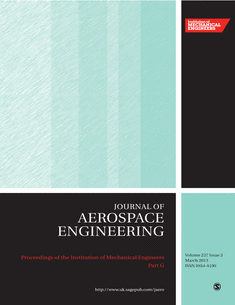
PROCEEDINGS OF THE INSTITUTION OF MECHANICAL ENGINEERS PART G-JOURNAL OF AEROSPACE ENGINEERING
Exploring the Frontiers of Mechanical EngineeringPROCEEDINGS OF THE INSTITUTION OF MECHANICAL ENGINEERS PART G-JOURNAL OF AEROSPACE ENGINEERING, published by SAGE PUBLICATIONS LTD, stands as a pivotal resource for those immersed in the disciplines of aerospace and mechanical engineering. With an ISSN of 0954-4100 and E-ISSN of 2041-3025, this journal not only contributes to the academic community but also reflects a robust commitment to advancing knowledge within these fields. Operating from the United Kingdom, it has garnered a respectable reputation, evidenced by its category quartiles—ranking Q3 in both Aerospace Engineering and Mechanical Engineering as of 2023. Established in 1989, the journal has evolved substantially over the years, serving as a platform for groundbreaking research and innovative methodologies. Researchers, professionals, and students alike will find a wealth of insights that foster collaboration and advance the frontiers of engineering. Although currently not available as an Open Access publication, the journal remains a critical reference point for those looking to deepen their understanding and contribute to ongoing developments in aerospace technology.